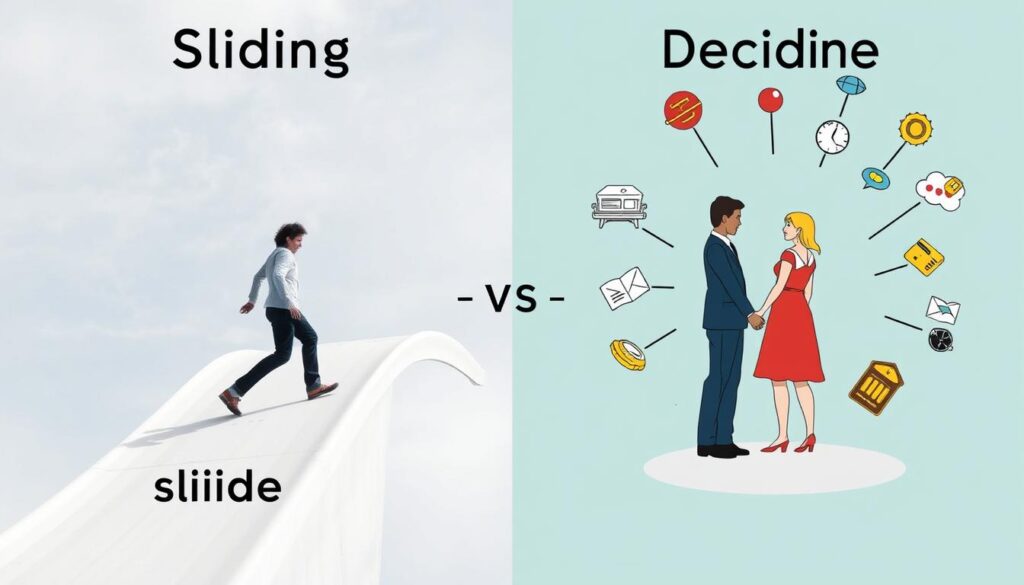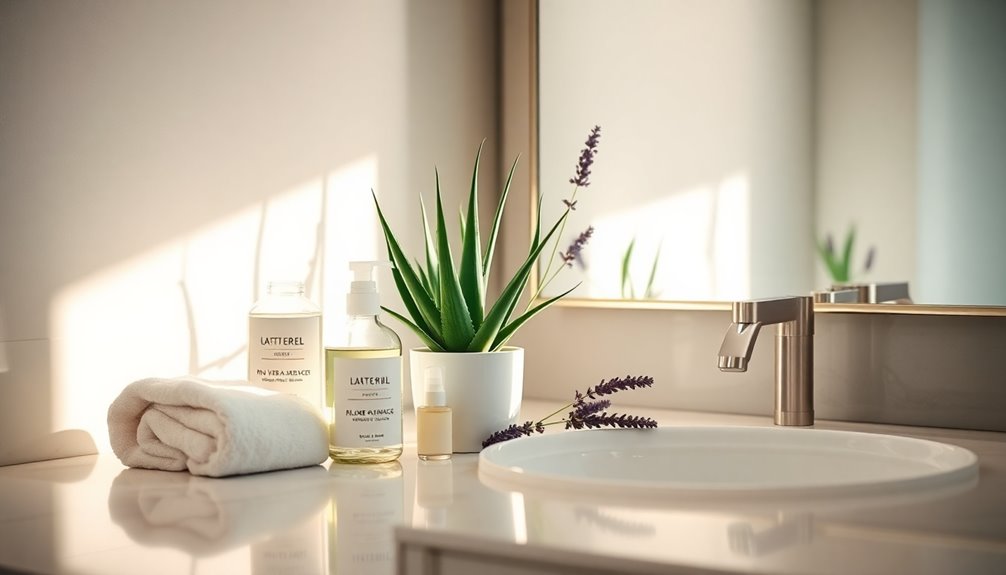Have you ever stopped to think about your marriage’s path? Maybe there was a time when decisions were made together easily, but now it feels like you’re just going along with changes without talking much. This sliding in marriage can make you feel lost and doubt the strength and safety of your bond. You’re not alone in this. Many couples face these issues. They deal with complicated relationship dynamics that can affect their joy and contentment.
Society is changing, and with it, how people view relationships. Open relationships or polyamory are becoming more common, which might stir up insecurities or jealousy. These feelings can turn into big obstacles over time. Understanding what sliding in marriage means and working together to prevent it can help you build a stronger connection. This guide is here to give you knowledge and tools. These will help you spot, tackle, and stop sliding actions. By doing so, your marriage can grow stronger and healthier.
Key Takeaways
- Sliding in marriage can lead to an unintentional drift from commitment and satisfaction.
- Recognizing sliding behaviors is key to maintaining open communication with your partner.
- Regular check-ins can help couples feel prioritized and engaged in the relationship.
- Jealousy is often a secondary emotion that requires attention and honest dialogue.
- Therapeutic support can provide couples with tools to address sliding behaviors effectively.
Understanding the Concept of Sliding in Relationships
Sliding in relationships is when couples smoothly move through big stages. Some examples include moving in together or getting married. They do this without serious talks. In the last 50 years, the rate of couples living together before marriage has jumped amazingly by 900%. This shows a change in how people go through different phases in their relationships. They often rely on instinct rather than making deliberate choices.
Making thoughtful decisions is key to a strong and happy relationship. When couples carefully think about big steps like cohabitation, it helps their commitment. Many see living together before marriage as a way to test their relationship. This could even make divorce less likely. Yet, living together can bring up issues like who does what around the house and money matters. These issues can greatly affect how happy the couple is.
Studies show that couples who skip important discussions face more problems. They have up to a 30% higher chance of arguments that aren’t resolved. They also feel less satisfied because their expectations aren’t met. Sadly, between 70-80% of couples miss out on these vital talks. They move forward without really examining their choices. But, relationships based on conscious decisions are usually more fulfilling. Clear rules and mutual choices come from talking openly and making decisions together.
Experts suggest that couples should spend time each month to talk about their relationship. Just one hour of focused conversation can greatly improve how happy both people feel. This can reduce the chance of sliding into big decisions without thinking by 40%. By realizing how important it is to make intentional decisions, you can improve your relationship. Your bond with your partner can become much stronger.
What is sliding in marriage?
When we look at relationships, understanding sliding versus deciding is key. Sliding happens when couples change their status without thinking it through together. This can lead to problems they didn’t expect. On the other hand, deciding means couples make choices and commitments together.
Studies have found that sliding into relationships often brings commitment troubles. This results in lower happiness and more dissatisfaction in the partnership.
Defining Sliding vs. Deciding
Dr. Scott Stanley, from the University of Denver, explains sliding. It’s common when couples start living together mostly because it’s easier. However, only about 25% of those couples had a clear choice to do so. This shows many lean towards sliding.
Because of this, there’s more instability. Research shows between 40-50% of these couples are unhappy with their relationship.
The Emotional Toll of Sliding
Sliding can hurt emotionally. People feel stuck because they didn’t make clear choices. This can lead to confusion and bitterness. Research says that 55% of those in sliding relationships are uneasy about their partner’s dedication to them.
This doubt harms how well partners talk to each other. In fact, 60-70% of people living together feel less committed than those who are married. The emotional pain from sliding can make the relationship worse and increase anxiety for both partners.

| Key Differences | Sliding | Deciding |
|---|---|---|
| Commitment Level | Lacks conscious intent; convenience-focused | Deliberate choices reflecting mutual commitment |
| Relationship Quality | Higher risk of dissatisfaction and instability | Often correlates with increased satisfaction |
| Emotional Impact | Can lead to confusion, resentment, feelings of entrapment | Tends to foster trust, clarity, and understanding |
| Communication | Poor communication; individuals feel less invested | Encourages open dialogues and transparency |
The Impact of Sliding on Relationship Quality
Understanding the impact of sliding on relationships is key for improving a couple’s bond. Relationships hit by sliding often face significant commitment challenges. Couples report feeling less satisfied when decisions are impulsive.
Sliding into major changes without clear plans leads to emotional distance. It also brings doubts about what’s next for them.
Lower Satisfaction and Commitment
Studies have found that individuals who slide rather than decide see less dedication. This leads to less satisfaction in their relationships. About 66.7% of cohabiting individuals said they just ended up living together without planning it together, hurting their bond.
This lack of purposeful decisions creates a domino effect. Earlier dedication issues can lead to more uncertainty and commitment problems later on.
Risks Associated with Sliding Transitions
Sliding comes with risks that can harm the stability of relationships. Not talking things through can lead to more fights and breakups. Being tied by shared debts, interestingly, can help a relationship last 10% longer, showing how important making choices together is.
Having deep conversations can cut down the distress from sliding. This opens the door to a stronger and healthier relationship.

| Relationship Aspect | Sliding Scenario | Deciding Scenario | Impact on Relationship Quality |
|---|---|---|---|
| Commitment Level | Lower | Higher | Reduced satisfaction and increased uncertainty |
| Conflict Management | Higher risk | Lower risk | Higher relationship stability |
| Intentional Decision-Making | Rarely practiced | Commonly practiced | Better relational outcomes |
| Extra-Dyadic Involvements | More frequent | Less frequent | Stronger emotional bonds |
Recognizing the Signs of Sliding
Understanding the signs of sliding is key for any relationship. It helps partners spot issues early on. Knowing about unplanned relationship shifts is critical too.
Unplanned Relationship Transitions
Couples often make big changes without real talks first. About half start living together without discussing what it means. These unplanned moments can bring confusion. Talking about goals and promises often is a must.
Lack of Clear Communication
Sliding often happens when couples don’t talk clearly. Not sharing feelings or expectations can lead to misunderstandings. Having open conversations about the relationship can prevent problems. It makes the bond stronger.
Common Triggers for Sliding
External pressures can push couples into quick decisions. Society, friends, or sudden surprises like an unexpected pregnancy are examples. These can change a relationship’s course without thought. Knowing these triggers helps couples make better choices.

| Signs of Sliding | Description |
|---|---|
| Unplanned Transitions | Couples moving in or becoming intimate without discussions |
| Lack of Communication | Failure to express expectations and feelings about decisions |
| External Triggers | Influences like societal norms or unexpected life events |
The Role of Commitment in Navigating Relationships
Commitment is the foundation of relationships, giving partners stability and security. Firm commitment helps couples face challenges better. Couples with strong commitment are often 70% happier than those in weaker relationships. This happiness comes from working towards common goals and supporting each other.
Commitment as a Foundation
Partners who are committed to each other invest more emotionally. Studies show 80% of these people want to keep their bond strong over time. Couples with high commitment levels have longer relationships, often by 40%, compared to those with weak commitment. Their strong foundation helps them openly talk about their future, making their relationship stronger.
Intentional Decision-Making
Intentional decision-making is key to keeping a relationship committed. Talking about important things, like milestones and dreams, helps couples connect better. Couples who do this are 40% happier than those who don’t talk things through. Half of the couples who don’t discuss these things feel unsure about their relationship, showing how crucial communication is.

| Study Focus | Findings |
|---|---|
| Commitment Levels | Couples report 70% higher satisfaction |
| Intentional Decision-Making | 40% increase in satisfaction rates |
| Perceived Interdependence | 80% express intention to stay together |
| Therapeutic Benefits | Therapy can improve outcomes by 50% |
Strategies to Prevent Sliding in Your Marriage
Building a strong foundation in your marriage needs active work. It’s about improving relationship joy. Using open communication, setting clear rules, and having frequent check-ups are key.
These steps help create a space where both feel heard and important. They guide the relationship through tough times.
Engaging in Open Conversations
Open communication is essential to stop sliding in relationships. Talking often about feelings, goals, and problems helps. It makes a secure space for honesty and trust.
By doing this, you and your partner handle changes better. It strengthens your bond.
Setting Clear Boundaries
Clear boundaries help understand each other’s needs. They stop confusion. Talk about important things like closeness, time together, and friends outside the relationship.
This not only keeps both safe but also lets you say what you need with confidence.
Regular Check-Ins with Your Partner
Having regular check-ins keeps your connection strong. These times let you look at your needs and feelings. You can deal with any issues early.
This practice shows you both care about your relationship’s health. It moves you towards a happier bond.

Exploring Jealousy and Emotional Responses in Sliding
Jealousy often stirs up deep emotions, highlighting insecurities and fears. It’s seen as a secondary emotion, stemming from not feeling good enough or scared of being left behind. Learning about jealousy helps couples turn it into a chance for honest talks and stronger emotional ties.
Understanding Jealousy as a Secondary Emotion
Jealousy shows there may be other issues in a relationship that need attention. It can come up when your partner seems interested in someone else or succeeds in goals you share. Seeing what triggers jealousy can offer insights into your emotions, paving the way for better communication. Healthy signs of jealousy include:
- Acknowledgment of jealous feelings
- Open communication about jealousy
- Self-reflection on triggers
- Acceptance of personal responsibility for emotions
Tools for Navigating Jealousy in Relationships
Dealing with jealousy well means using tools to build trust and closeness. Speaking honestly about jealousy helps create a supportive space. Other steps involve writing down your feelings, getting therapy if jealousy keeps up, and looking deeply into why you feel this way. These strategies can prevent the toxic side of jealousy, which includes controlling actions and lack of trust. This usually results in:
- Loss of trust in the relationship
- More arguments
- Partners becoming more defensive

The Importance of Thoughtful Decision-Making
Thoughtful decision-making is key to better relationships. Effective communication makes relationships stronger. Discussing future goals and values helps partners feel respected and cherished. This proactive step fights the downsides of not planning together. It leads to a more devoted partnership.
Methods to Enhance Relationship Satisfaction
To improve relationship happiness, thoughtful decision-making is vital. Here are some ways to do it:
- Regular discussions about future aspirations.
- Conflict resolution techniques should be practiced to address grievances constructively.
- Engage in shared planning for big events, like moving in together or having kids.
- Conduct periodic relationship check-ins to reassess goals and feelings.
Decision-Making Processes for Stronger Bonds
Using a structured decision-making process improves relationship quality. Couples can use different techniques to clear up their goals and handle challenges:
| Technique | Description |
|---|---|
| Brainstorming Sessions | Partners gather to openly discuss different topics about their relationship. |
| Pros and Cons Lists | Making lists of benefits and drawbacks helps in big life decisions, like moving in together. |
| Therapist Consultations | Getting advice from professionals offers neutral viewpoints, which helps in making smarter decisions. |

These approaches boost decision-making skills and commitment. Effective communication creates an open environment, greatly affecting relationship happiness. When partners feel heard and valued, their connection deepens. This improves the quality of the relationship.
Seeking Support: Resources for Couples
It’s key for couples facing tough times to find support. Couples therapy is really helpful, giving new ways to connect and talk. Looking into therapy can make relationships much stronger.
Therapeutic Options
Couples therapy offers different plans fitting each couple’s needs. It helps partners manage their feelings better when they interact. Here are some methods it includes:
- Emotionally Focused Therapy (EFT): Shows 75% success, EFT helps partners bond emotionally.
- Gottman Method: Identifies nine key areas for a strong relationship, aiding in building bonds.
- Imago Relationship Therapy: Encourages looking at childhood experiences to understand adult behaviors, increasing empathy.
Now, many mental health places have a sliding scale for therapy costs, making help more reachable. Since 2010, over 18.8% of these places offer prices based on what clients can pay. This includes considering income, family size, and finance. It makes therapy fair and open to more people.
Community and Peer Support
Joining community supports is also a good move for couples. Being part of workshops or groups helps talk about relationship issues safely. Peer support can also add to the benefits of therapy, making your relationship journey better.
Look at these community supports:
| Resource Type | Description | Accessibility |
|---|---|---|
| Community Mental Health Centers | Offer sliding-scale therapy for more affordable counseling. | Local Residents |
| Nonprofit Organizations | Work on making mental health help easier to get via workshops. | Mixed Income Levels |
| Online Counseling Platforms | Give more flexible and often cheaper therapy for couples. | Nationwide Access |
| Support Groups | Lead talks on common relationship hurdles. | Varied Costs |
Looking for support is a positive way to strengthen your relationship. Using therapy, community help, and peer support lays a solid base for your partnership.

Conclusion
Sliding in marriage needs our focus if we want relationships that last. Spotting sliding signs like unplanned changes and vague talks helps us. This way, we can work toward a stronger bond. Couples who commit to their partnership tend to do better.
Choosing how to handle your relationship’s challenges is crucial. Research shows that couples who face changes together are happier and more committed. Commitment improves your connection and helps both partners grow.
Support and honest conversations are essential in any marriage. Working on your relationship takes effort and understanding. With these practices, you can avoid sliding in marriage. This lets you build a relationship that lasts through the years.










